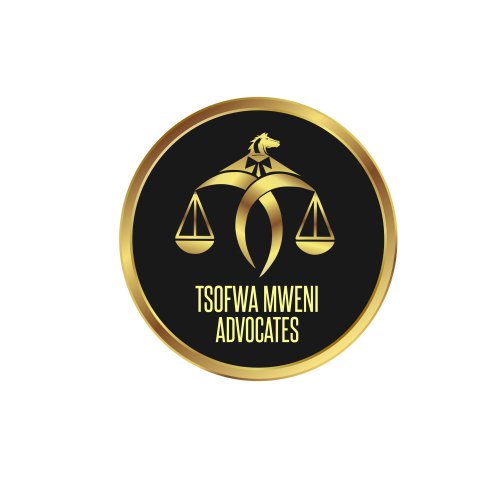Best Structured Finance Lawyers in Mombasa
Share your needs with us, get contacted by law firms.
Free. Takes 2 min.
List of the best lawyers in Mombasa, Kenya
Legal guides written by Adroit Law LLP:
- Kenya Launches Digital Nomad Visa: A Gateway for Remote Workers
- Navigating the Payment System License Maze in Kenya
- Navigating the Complexities of Mining Licenses and Permits in Kenya: A Look into Artisanal and Large-Scale Operations
About Structured Finance Law in Mombasa, Kenya
Structured finance in Mombasa, Kenya refers to complex financial transactions designed to address unique funding needs that cannot be solved with standard financial products. These transactions often involve the pooling of financial assets and the issuing of securities backed by cash flows from those assets. In the Kenyan context, structured finance solutions are increasingly used by firms, developers, and financial institutions to manage risk, raise capital, or enable significant infrastructure projects. The field is governed by a mixture of local financial regulations, international best practices, and specific contractual agreements.
Why You May Need a Lawyer
Engaging in structured finance deals often involves complex negotiations, documentation, and compliance with multiple legal frameworks. Here are some common situations where you might require legal assistance in the field of structured finance in Mombasa:
- Structuring a new securitization or asset-backed security transaction
- Negotiating and drafting sophisticated financing agreements
- Ensuring compliance with all regulatory requirements under Kenyan law
- Conducting due diligence on asset pools or counterparties
- Managing risks associated with cross-border or syndicated financing
- Dispute resolution involving structured finance structures or instruments
- Obtaining approvals or licenses from regulatory bodies such as the Capital Markets Authority or Central Bank of Kenya
- Advising on tax implications of structured finance models
Because structured finance touches on many areas of law and regulation, having knowledgeable legal counsel is essential to navigate potential pitfalls and to maximize your investment or project outcome.
Local Laws Overview
Structured finance transactions in Mombasa must operate within the frameworks set by Kenyan law and regulatory bodies. Key aspects to be aware of include:
- Capital Markets Act: Governs the issuance and trading of securities, including asset-backed securities
- Banking Act: Regulates financial institutions engaged in lending, securitization, or other structured products
- Central Bank of Kenya (CBK) Guidelines: Provides additional compliance requirements for lenders and originators
- Registry of Securities: All underlying assets used as collateral must be properly registered and documented
- Taxation Laws: Stamp duty and tax implications must be considered when creating special purpose vehicles or transferring assets
- Insolvency Act: Sets out procedures if one party becomes insolvent, affecting cash flows and counterparty risks
- Data Protection Act: Protects confidentiality of personal and financial data involved in transactions
- Anti-Money Laundering Regulations: Ensures all transactions are legitimate and properly reported
Engaging local legal expertise ensures your structured finance transactions comply with these and any emerging regulatory changes.
Frequently Asked Questions
What is structured finance and how does it differ from traditional finance?
Structured finance refers to complex financial transactions involving the pooling and repackaging of assets into securities. Unlike traditional finance, structured finance deals are highly customized and often involve multiple parties and legal entities.
Who regulates structured finance transactions in Kenya?
The Capital Markets Authority, Central Bank of Kenya, and sometimes the Kenya Revenue Authority and Competition Authority regulate various aspects of structured finance deals.
What assets can be securitized in Kenya?
Common assets include loans, mortgages, receivables, and infrastructure project revenues. The assets must be legally transferable and meet regulatory requirements.
What are the risks involved in structured finance?
Risks include credit risk, market risk, legal and regulatory risk, counterparty default, and operational challenges related to cash flow management.
Is it necessary to set up a special purpose vehicle (SPV) for structured finance deals?
Yes, most structured finance deals in Kenya require an SPV to isolate assets and manage risk, in compliance with local regulations.
How long does it take to complete a structured finance transaction?
Timeframes vary depending on transaction complexity but generally range from several weeks to a few months, accounting for regulatory approvals and due diligence.
Do structured finance transactions face any tax obligations?
Yes, taxes such as stamp duties, withholding tax, and value-added tax may apply depending on the structure and assets involved.
What legal documents are typically required?
Key documents include offering memoranda, trust deeds, security agreements, loan agreements, and regulatory disclosures.
Can foreign investors participate in structured finance deals in Mombasa?
Yes, provided they comply with Kenyan investment and financial regulations, including foreign exchange and capital markets rules.
What happens if one party to the transaction defaults?
Remedies are based on the agreements and relevant laws, which may include collateral enforcement, restructuring, or court proceedings.
Additional Resources
For more information and support on structured finance in Mombasa, you may find these resources helpful:
- Capital Markets Authority of Kenya
- Central Bank of Kenya
- Kenya Bankers Association
- Law Society of Kenya (Coast Branch)
- Kenya Revenue Authority (for tax matters)
- Kenya Investment Authority
Consulting with these organizations can provide useful guidance on compliance, licensing, and best practices in structured finance.
Next Steps
If you are considering a structured finance transaction or facing legal issues in this field in Mombasa, it is advisable to:
- Document your objectives and the assets involved
- Consult a qualified lawyer with expertise in structured finance and deep knowledge of Kenyan law
- Request a legal review of all draft agreements and regulatory requirements
- Engage with relevant regulatory authorities early in the process
- Ensure all transactions are properly documented and registered
Taking these steps will help ensure your structured finance deal is compliant and positions you for a successful outcome. Always work closely with trusted legal and financial advisors throughout the process.
Lawzana helps you find the best lawyers and law firms in Mombasa through a curated and pre-screened list of qualified legal professionals. Our platform offers rankings and detailed profiles of attorneys and law firms, allowing you to compare based on practice areas, including Structured Finance, experience, and client feedback.
Each profile includes a description of the firm's areas of practice, client reviews, team members and partners, year of establishment, spoken languages, office locations, contact information, social media presence, and any published articles or resources. Most firms on our platform speak English and are experienced in both local and international legal matters.
Get a quote from top-rated law firms in Mombasa, Kenya — quickly, securely, and without unnecessary hassle.
Disclaimer:
The information provided on this page is for general informational purposes only and does not constitute legal advice. While we strive to ensure the accuracy and relevance of the content, legal information may change over time, and interpretations of the law can vary. You should always consult with a qualified legal professional for advice specific to your situation.
We disclaim all liability for actions taken or not taken based on the content of this page. If you believe any information is incorrect or outdated, please contact us, and we will review and update it where appropriate.

















